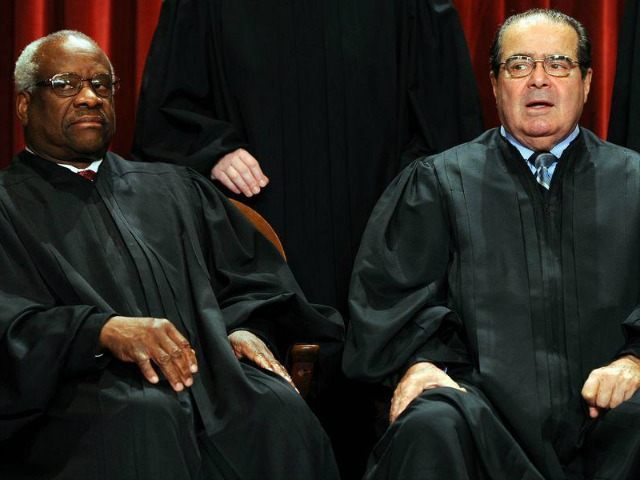The Supreme Court of the United States (SCOTUS) refused last year to intercede and reverse a Court of Appeals for the Seventh Circuit ruling that upheld the “assault weapons” ban in Chicago’s Highland Park. Associate Justice Clarence Thomas dissented–Antonin Scalia joining him–suggesting that wordsmiths were finding categories of guns to ban by listing types of firearms outside those explicitly in focus in District of Columbia v. Heller (2008).
In other words, Heller struck down D.C.’s handgun ban, but the ban in Highland Park is on “assault weapons.”
The problem with this, as Thomas–joined by Scalia–explained, is that the Second Amendment protections reiterated in Heller were not limited to striking down handgun bans. Rather, the decision was to protect “firearms that millions of American commonly own for lawful purposes.”
In dissenting from the December 7 SCOTUS decision not to intercede and strike down the “assault weapons” ban, Thomas first set forth the details of the ban and then provided his reasons, shared by Scalia, for viewing the ban as a violation of the Second Amendment.
Ban details:
The City of Highland Park, Illinois, bans manufacturing, selling, giving, lending, acquiring, or possessing many of the most commonly owned semiautomatic firearms, which the City branded “Assault Weapons”. … The City also prohibited “Large Capacity Magazines,” a term the City used to refer to nearly all ammunition feeding devices that “accept more than ten rounds.”
The City gave anyone who legally possessed “an Assault Weapon or Large Capacity Magazine” 60 days to move these items outside city limits, disable them, or surrender them for destruction. … Anyone who violates the ordinance can be imprisoned for up to six months, fined up to $1,000, or both.
Thomas noted that even within the Seventh Circuit’s considerations, justices admitted that certain “assault weapons” make formidable self-defense weapons and may be a good choice for that application because they are “less dangerous per shot than larger caliber pistols or revolvers.” Yet the Seventh Circuit upheld the “assault weapons” ban anyway, by recognizing that Heller “holds that a law banning the possession of handguns in the home … violates” the Second Amendment.
The thinking is that an “assault weapon” is not a handgun; therefore, it may not have the same protections.
But Seventh Circuit Justice Daniel Manion looked beyond the explicit mention of one type of gun over another and simply considered the Second Amendment protections reaffirmed in Heller, as well as in McDonald v. Chicago (2010). After doing this, he dissented from the Seventh Circuit decision, saying, “Both the [‘assault weapons’ ban] and this court’s opinion upholding it are directly at odds with the central holdings of Heller and McDonald.” That is Thomas’s point precisely, and it is the point for which Scalia stood, as well.
Thomas criticized the majority SCOTUS decision to allow the Seventh Circuit’s ruling to stand, suggesting the SCOTUS action runs the risk of allowing the Seventh Circuit to “[relegate] the Second Amendment to a second-class right.” And he pointed to an even greater existential risk arising from allowing “assault weapons” bans to stand when he wrote, “If a broad ban on firearms can be upheld based on conjecture that the public might feel safer (while being no safer at all), then the Second Amendment guarantees nothing.”
The February 13 death of Justice Antonin Scalia leaves the GOP-controlled Senate with the duty to refuse confirmation of any jurist to the SCOTUS unless that jurist is as committed to the Constitution as was Scalia, as is Justice Thomas.
AWR Hawkins is the Second Amendment columnist for Breitbart News and political analyst for Armed American Radio. Follow him on Twitter: @AWRHawkins. Reach him directly at awrhawkins@breitbart.com.

COMMENTS
Please let us know if you're having issues with commenting.